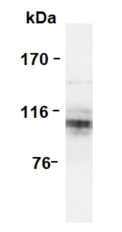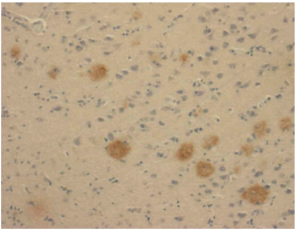Alzheimer's Disease-related Antibodies (APP, ApoE4)
Amyloid Precursor Protein Antibody
| Cat. No. | Product Name | Grade | Package Size | |||
|---|---|---|---|---|---|---|
| 014-27241 | Anti Amyloid Precursor Protein, Monoclonal Antibody (3E9) | For immunochemistry | 10 µL | |||
| 010-27243 | 50 µL | |||||
| Antibody Information | ||||||
| Antigen | Amyloid Precursor Protein | Application | WB | Isotype | IgG1 | ■WB Image Mouse brain lysate  |
| Antigen information | Synthetic peptide Corresponding to 18-38 amino acid of APP695 |
Species cross reactivity | Mouse, Human | Label | Unlabeled | |
| Antigen synonyms | APP | Host | Mouse | Clone No. | 3E9 | |
| Summary | Amyloid beta (Aβ) is considered a possible cause of Alzheimer’s disease, because it is the major component of senile plaques. Aβ is produced when the amyloid precursor protein (APP) is cleaved by α-secretase and β-secretase. APP belongs to an evolutionary conserved gene family including amyloid precursor-like proteins (APPL1 and APPL2). This item is a mouse monoclonal antibody which reacts with APP. | |||||
| Reference | - | |||||
Human ApoE4 Antibody
| Cat. No. | Product Name | Grade | Package Size | |||
|---|---|---|---|---|---|---|
| 018-27261 | Anti Human Apolipoprotein E4, Monoclonal Antibody (1F9) | For immunochemistry | 10 µL | |||
| 014-27263 | 50 µL | |||||
| Antibody Information | ||||||
| Antigen | Apolipoprotein E4 | Application | WB, IHC | Isotype | IgG1 | ■Immunostaining Image Alzheimer’s disease patient brain cortex  |
| Antigen information | Synthetic peptide Corresponding to 109-119 amino acid of human apolipoprotein E4 |
Species cross reactivity | Human | Label | Unlabeled | |
| Antigen synonyms | ApoE4 | Host | Mouse | Clone No. | 1F9 | |
| Summary | Apolipoprotein E (ApoE) is a glycoprotein about 34kDa. ApoE has three isoforms, ApoE2, E3 and E4. ApoE4 is a risk factor for Alzheimer’s disease. The item is a mouse monoclonal antibody which reacts with ApoE4. | |||||
| Reference | - | |||||
Product List
- Open All
- Close All
For research use or further manufacturing use only. Not for use in diagnostic procedures.
Product content may differ from the actual image due to minor specification changes etc.
If the revision of product standards and packaging standards has been made, there is a case where the actual product specifications and images are different.




